Welcome to the world of Pay-Per-Click (PPC) advertising! As a beginner in digital advertising, you may feel overwhelmed by the vast amount of information available. Fear not, for in this guide, we will break down PPC advertising into digestible chunks, allowing you to understand the fundamentals, benefits, and step-by-step process of setting up your first PPC campaign. Let’s dive in and demystify PPC Advertising!
Chapter 1: Understanding PPC Advertising
PPC advertising is a digital marketing model where advertisers pay a fee each time their ad is clicked. These ads are usually displayed on search engines (Google, Bing, etc.), social media platforms (Facebook, Twitter, etc.), or other websites relevant to the advertiser’s target audience. PPC is a cost-effective way to drive targeted traffic to your website, as you only pay when someone actually clicks on your ad, indicating genuine interest.
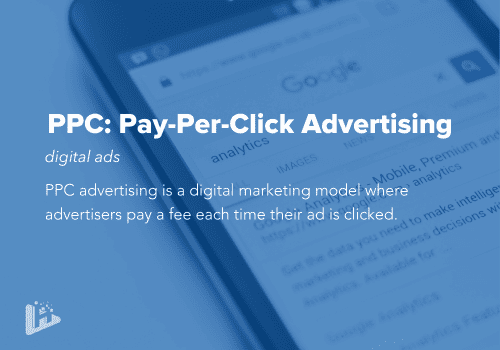
Chapter 2: Benefits of PPC Advertising
1. Instant Visibility: Unlike organic search efforts, which may take time to gain traction, PPC ads offer instant visibility on search engine results pages (SERPs) and social media platforms.
2. Targeted Reach: PPC allows you to target specific keywords, demographics, locations, and interests, ensuring your ads reach the right audience at the right time.
3. Measurable Results: With PPC, you can track various metrics, such as clicks, impressions, conversions, and return on investment (ROI), giving you clear insights into your campaign’s performance.
4. Control Over Budget: One of the most significant advantages of PPC is that you have complete control over your daily, weekly, or monthly budget, allowing you to allocate funds according to your needs.
Chapter 3: Key Components of a PPC Campaign
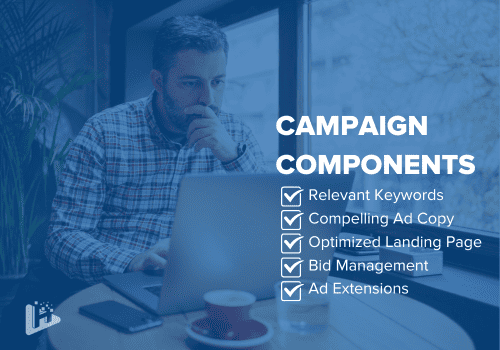
Keywords:
Selecting relevant keywords is crucial for the success of your PPC campaign. Users type these terms into search engines when looking for products or services similar to yours. Conduct thorough keyword research to identify the most relevant and high-performing keywords.
Ad Copy:
Your ad copy plays a vital role in attracting potential customers. Craft compelling and concise ad copy that includes the main keyword and a clear call-to-action (CTA). Focus on unique selling points to differentiate yourself from competitors.
Landing Pages:
Users should be directed to a relevant and well-designed landing page once they click on your ad. The landing page should align with the ad’s message and offer a seamless user experience, ultimately leading to conversions. If the landing page is not quality, the likelihood of it showing to users, even if there’s money behind it, is decreased. Google wants to ensure that users are sent to the most relevant content so you won’t show up if your landing page is limited, spammy, or broken.
Bid Management:
Bidding is the process of setting the maximum amount you are willing to pay for a click on your ad. A combination of bid amount and ad relevance determines your ad’s position on SERPs.
Ad Extensions:
Ad extensions are additional pieces of information you can include with your ad to enhance its visibility and appeal. Examples include site links, call extensions, and location extensions.
Chapter 4: Platforms for PPC Advertising
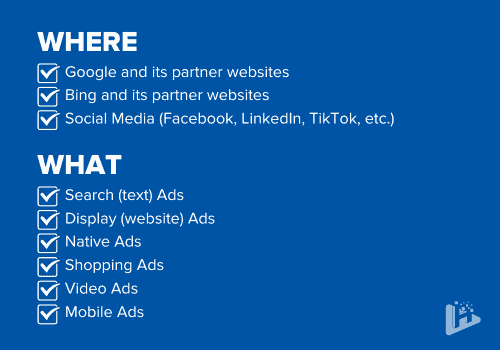
Google Ads
As the most popular PPC platform, Google Ads allows advertisers to display their ads on Google’s search engine and its partner websites.
Google Ads is the heart of PPC advertising. It offers various ad formats that cater to different marketing goals. One of the most common ad formats is “Search Ads.” These appear at the top of Google’s search results when users search for specific keywords related to your business. Another powerful format is “Display Ads,” which can be seen on numerous websites across the internet. These ads include images or banners and can be targeted based on audience interests or website content. Google’s “Shopping Ads” are perfect for e-commerce businesses, displaying product images, prices, and details directly in search results. Finally, the “Video Ads” on YouTube catch users’ attention before or during videos, showcasing your content visually.
Microsoft Advertising
Microsoft Advertising (formerly Bing Ads) provides a similar PPC experience to Google Ads but targets users on the Bing search engine and its network of partner sites. While the search volume may be lower than Google, it can still be valuable for reaching certain demographics.
Similar to Google Ads, Microsoft Advertising provides “Search Ads” that appear on the Bing search engine. While the search volume might be lower than Google, these ads still reach a substantial audience. Additionally, they offer “Shopping Ads” and “Image Ads” on the Microsoft Audience Network, similar to Google’s Display Network. This network extends your reach beyond search results to partner sites. Despite lower search volume, Microsoft Advertising can be beneficial for businesses targeting specific demographics or niches.
Social Media Ads
Facebook, Instagram, LinkedIn, and other social media platforms offer PPC advertising options that enable precise audience targeting based on users’ interests, behaviours, and demographics.
Social media platforms offer a treasure trove of PPC options tailored to specific audiences. On Facebook and Instagram, “Image Ads” and “Video Ads” blend seamlessly into users’ feeds. These platforms allow in-depth audience targeting based on users’ interests, behaviors, and demographics. “Carousel Ads” let you showcase multiple images or videos in a single ad, offering more content in one go. LinkedIn is perfect for B2B marketing, offering “Sponsored Content,” “Sponsored InMail,” and “Display Ads” that reach professionals based on job titles, industries, or company sizes. Other platforms like Twitter and Pinterest offer similar ad formats, enabling businesses to tap into their unique user bases.
In a nutshell, each platform provides a diverse range of ad formats that cater to different marketing goals and audience preferences. By strategically choosing the right platform and ad type for your business, you can leverage the power of PPC advertising to effectively reach your target audience and achieve your marketing objectives.
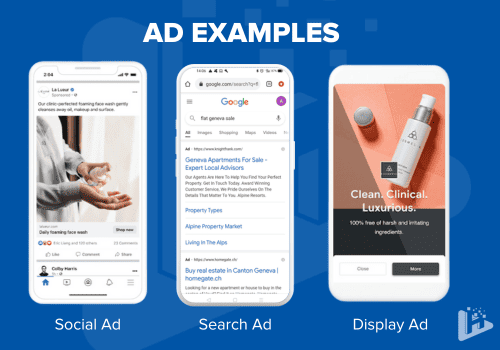
Chapter 5: Setting Up Your First PPC Campaign
1. Define Goals: Start by outlining your campaign objectives. Whether it’s increasing website traffic, generating leads, or boosting sales, clear goals will help you measure success.
2. Choose the Right Platform: Select the PPC platform that aligns with your target audience and campaign goals.
3. Conduct Keyword Research: Use keyword research tools to identify relevant keywords that match your business offerings. Organize them into relevant ad groups for better performance.
4. Create Compelling Ad Copy: Write persuasive ad copy that resonates with your audience, includes relevant keywords, and has a strong CTA. We recommend an actual human should write these to appeal to other humans. AI tools are cool but a human touch is always recommended when it comes to marketing.
5. Design Effective Landing Pages: Optimize your landing pages to deliver a seamless user experience and encourage conversions.
6. Set Budget and Bids: Allocate your budget wisely across your campaign and set competitive bids based on keyword performance and your objectives.
You’re ready to launch!
Launching Your Campaign
Monitor and Optimize Your PPC Campaign
Navigating the world of digital marketing requires understanding the importance of optimizing your campaigns. You can’t just set it and forget it (that’s why we have real people dedicated to your campaigns when you launch ads with us).
Think of it like tending to a growing plant – continuous care leads to better results. You don’t just set it up and then let it go spending money on useless results (or not spending at all and getting zero results); it needs regular checks and adjustments. This ongoing process is all about testing, refining, and optimizing your ads to get the best outcomes. Think of it as a journey where you’re constantly learning and making things better.
Data is your secret weapon here. You should regularly review how your ads are doing by looking at numbers like how many people clicked on your ad and how many actually bought something. This data helps you make smart choices. If something isn’t working well, you can change it based on what the data tells you. This approach not only helps you make more money from your ads but also makes sure your ads match your bigger marketing goals.
In today’s world, it’s all about using facts and figures to make decisions. By using data and making improvements little by little, your PPC campaigns can become powerful tools for business growth. They can help you reach more customers, make more sales, and build lasting relationships.
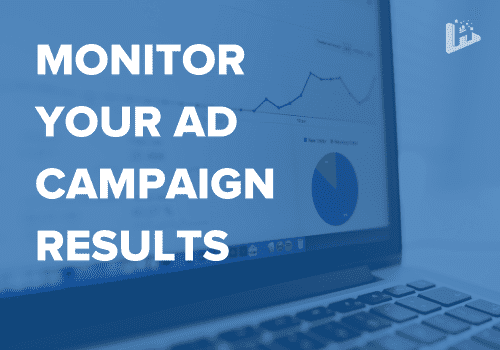
It’s More Than Set It and Forget It
After you launch an ad, it’s important to continue to check it because Google is constantly analyzing its quality and effectiveness. This means that if your ad is showing up and people are clicking but quickly bouncing, that’s a red flag and Google may show your ad less, leading to fewer impressions and ultimately, fewer leads. Why? Ad quality, my friend.
Landing page optimization and quality ads are essential pieces of the PPC puzzle that beginners shouldn’t overlook.
Landing page optimization involves creating a web page that aligns with the ad’s message and offers a seamless experience for visitors. If your ad promises something exciting but your landing page doesn’t deliver, you risk losing potential customers. A well-designed landing page with clear information and a call-to-action can boost conversions and make your investment in ads more worthwhile.
Moreover, the quality of your ads matters a lot. It’s not just about having eye-catching visuals and clever wording; it’s about making sure your ads target the right audience. If you’re promoting sports equipment, you want your ads to reach people interested in sports, not gardening. Spending your budget on well-targeted ads means your message reaches those who are most likely to be interested in what you offer, increasing the chances of getting positive results.
PPC is an ongoing process of testing, refining, and optimizing. With dedication, creativity, and a data-driven approach, you can leverage PPC advertising to grow your business, increase brand visibility, and achieve your marketing goals.
Regularly review your campaign’s performance and make data-driven adjustments to improve ROI and achieve your goals.
Harvard Media is Here to Help Take Your Digital Ads to the Next Level

Benefits of Digital Advertising with Harvard Media
- Expertise and Experience: Harvard Media’s team consists of seasoned PPC experts with years of experience crafting successful campaigns across various industries. Our expertise ensures that your campaigns are optimized for maximum performance. Our team skillfully manages bids and ad placements to ensure your ads achieve prime visibility while staying within your budget. We optimize bids based on performance data to get the most out of your ad spend.
- Targeted Reach and Research: We conduct in-depth keyword research to identify the most relevant and high-performing keywords for your business. Our tailored targeting strategies ensure that your ads reach the right audience at the right time.
- Creative Ad Copy: Our copywriters create compelling and persuasive ad copy that resonates with your target audience and encourages clicks and conversions. We focus on highlighting your unique selling points to stand out from the competition.
- Landing Page Optimization: Harvard Media analyzes your landing pages to ensure they are optimized for conversions. By aligning your ad copy with relevant and engaging landing pages, we maximize your chances of turning clicks into customers.
Let’s get started!
Define Your Goals
Share your campaign objectives with Harvard Media, and we will tailor our strategies to meet your specific needs, whether it’s brand awareness, lead generation, or driving sales. We will give you the optimal platforms for your desired audience, a potential budget to reach the customers you want, and a strategy to drive traffic to your site.
Amazing Creative
Our team of designers and copywriters work to create digital ads that flaunt your business, products, and services, and we do it well! We work with you to create Google Display Ads in all the correct sizes and dimensions, Social Media Ads with compelling copy to match your brand and engage with the audience, or Search Ad copy that drives clicks.
Collaborate and Communicate
Our team works closely with you, providing regular updates and reports on your campaign’s performance. You can trust us to keep you informed every step of the way.

Focus on Your Business
With Harvard Media handling your PPC campaigns, you can concentrate on what you do best – running your business. Leave the digital advertising to us!
Harvard Media can be your dependable partner in achieving digital marketing success. Let us handle the technicalities while you focus on growing your business. With Harvard Media’s expertise, experience, and dedication, your PPC campaigns will be in safe hands. Reach out to us today, and together, we’ll take your online presence to new heights through the power of digital advertising!



